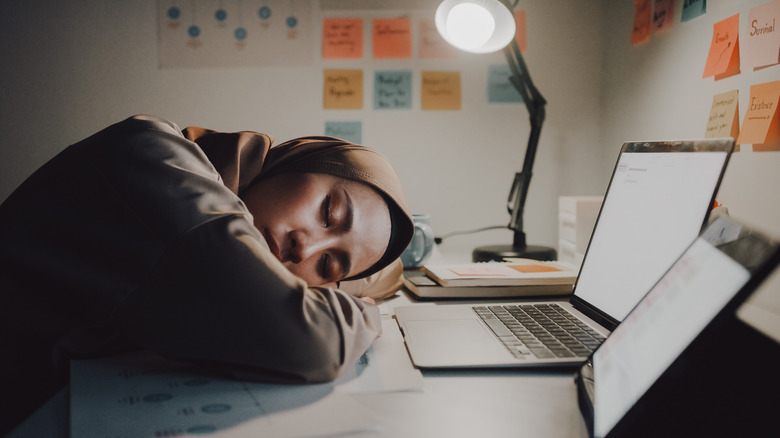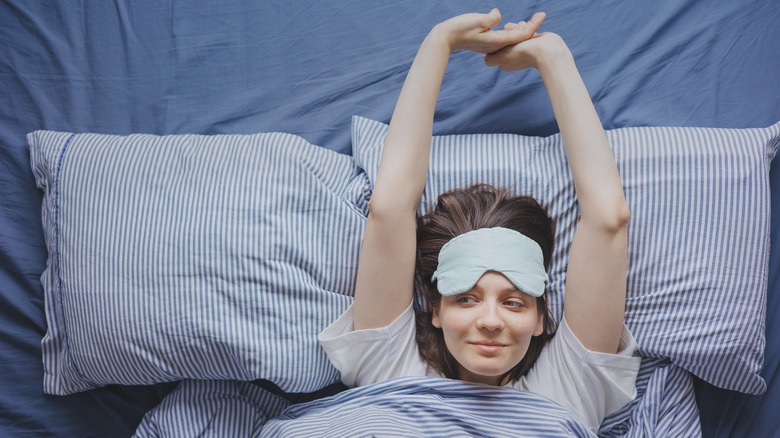When You Oversleep, This Is What Happens To Your Early Death Risk
Sleep has always been one of those things science has held in high esteem. You've got to get a full night's sleep in order to feel refreshed in the morning. Additionally, a lot happens while you snooze that actually helps keep your system running the way it should. From your cognitive capabilities and mental health to physical performance and warding off disease, sleep has an influence on a number of important things.
With social media platforms like TikTok romanticizing sleep hygiene routines, people are on a quest to get their recommended hours of shut-eye, which for the average adult is anything between seven to nine hours of sleep. Even the ever-popular hustle culture hasn't fully eradicated voices of reason that promote self-care via adequate sleep.
Poor or insufficient amount of sleep is bad for you. But what about oversleeping? Turns out, sleeping more than your recommended hours on average can actually increase your risk of premature death. According to a 2018 study published in the Journal of the American Heart Association that analyzed 74 studies from 1970 to 2017 with a total population of 3.3 million, sleeping for more than eight hours was linked with increased risk of cardiovascular disease and early death. With premature death, the risk jumped up 23% for those who slept for nine hours. It doesn't max out there: The risk climbed to 52% for those who snoozed for 10, and went up another 14% for 11 hours. Less than seven hours of sleep also had negative health consequences like risk of stroke.
How is oversleeping connected to premature death?
The 2018 study isn't the only one out there. In fact, there is quite a bit of research that seems to say that sleeping too much is riskier than you think. Per a multi-ethnic cohort study published in 2014 in Preventive Medicine, both short and long sleep durations were linked with all-cause and cardiovascular disease mortality.
Getting more than 10 hours of sleep was associated with metabolic syndrome and elevated triglycerides in both male and female participants in a 2018 study published in BMC Public Health. The same study also found a link between reduced good cholesterol levels, also known as high-density lipoprotein (HDL) cholesterol, increased fasting glucose markers, and increased waist circumference in women who slept for more than 10 hours. Metabolic syndrome refers to a cluster of health conditions that include obesity, high blood pressure, and unhealthy cholesterol levels, and has been linked with premature death in men and women.
It is important to note, however, that while these studies show correlation between early death and oversleeping, it is difficult to establish a definite causation. Researchers are quick to point out that the studies could be reflecting certain underlying health conditions (physical or mental) that could be causing the participants to sleep more. For example, some research has found that depression and low socioeconomic status were common among over-sleepers. Not having a job, financial trouble, and poor nutrition can also cause a person to sleep more.
Should you be concerned about dying early if you oversleep?
Since science hasn't established a definite causation between oversleeping and premature death risk, experts think it's unwarranted to worry about getting more than your recommended hours of sleep on and off.
That being said, if you're regularly sleeping past your alarm, waking up feeling tired, and finding a need to sleep during the day, it might be time to have a chat with your doctor. A lot of different things could be causing constant oversleeping, like underlying mental or physical health conditions, sleep disorders, alcohol or drug use, medications, poor nutrition, etc. Finding solutions for these can move you in the right direction when it comes to getting adequate sleep that makes you feel refreshed in the morning.
As for just how much sleep you should be getting, this number varies depending on your age, activity levels, any chronic diseases you may have, etc. While infants can sleep for up to 17 hours at a time and preteens between nine and 11 hours, for adults, the usual recommendation is seven to nine hours (give or take an hour depending on your particular need for sleep). The key might be to listen to your body and see what number fits you best. If six hours is making you wake up tired every morning, perhaps you need eight or nine hours. While on the topic of premature death, it's worth noting what can happen to your early death risk if you have anxiety.



